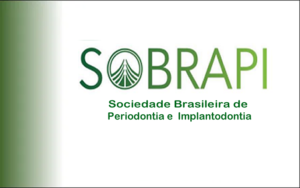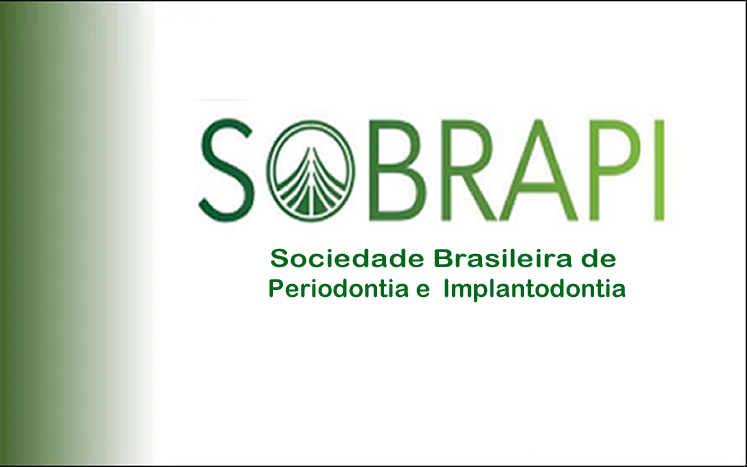Tips are published weekly and aim to provide important information in a simple and objective way, helping the CD to communicate with his patient.
It is an initiative of SOBRAPE's Social Responsibility Committee.
Like, follow and suggest...
SEE TIPS
Click on the title to expand
 Often, we have a sore in our mouths and don't realize it, so it's very important to be aware of certain situations:
Often, we have a sore in our mouths and don't realize it, so it's very important to be aware of certain situations:
If you notice sores, swellings, lumps or thick spots anywhere around your mouth or throat, areas with red or white lesions in your mouth or on your lips, swellings on your gums that make it difficult to wear dentures - ask yourself if you've noticed them before and, if so, whether they've been there for more than two weeks.
Other important facts about mouth cancer:
- Softened teeth without an apparent dental cause can indicate cancer.
- According to the UK Mouth Cancer Foundation, 90% of people with mouth cancer use tobacco. It also found that excessive alcohol use also increases the chance of developing the disease and, when the two factors are combined, the risk is even higher.
- Age and eating habits can also increase the risk. Typically, the disease appears in patients over the age of 40. A diet lacking in fruit and vegetables can facilitate the development of the disease.
- The sun is also a risk factor! In this case, for lip cancer! Tell your patients to use lip sunscreen every day.
- Recently, there has been an increase in oral cancer associated with sexually transmitted human papillomavirus (HPV 16).
If you suspect an injury, contact your dentist immediately.
SOBRAPE's social responsibility committee.
Text written by Juliane Butze @perioprof
 *Dr. Renata Cimões
*Dr. Renata Cimões
The month of September sees the GREEN SEPTEMBER campaign and September 27th is National Organ Donation Day, so let's understand a little about it in the words and experience of Prof. @drarenatacimoes:
"Organ donation is a very important issue and needs to be publicized and talked about.
In Brazil, there are more than 45,000 people waiting in line for an organ to be transplanted.
The line isn't moving because many families don't authorize the donation of their loved one, and even if it's the wishes of the person who died, the family is the key to this authorization.
Waiting for a call saying that the organ has arrived is extremely distressing, only those who have been through it can tell you.
Organ and tissue donation is proof of love and solidarity.
Don't forget to tell your family about your desire to be a donor, you can save many lives with this act.
My son once needed a heart valve and it was a very difficult time, thankfully a supportive family donated the organs and my son can now live a healthy and happy life".
*Social Responsibility Committee - SOBRAPE
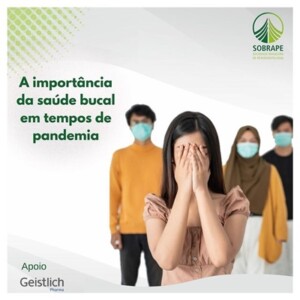 *Daniela Grisi
*Daniela Grisi
The COVID-19 pandemic has greatly altered people's daily lives and dental care routines.
There is great concern about the risk of an increase in periodontal and peri-implant diseases, which are no longer diagnosed early, and the recurrence of these diseases due to lack of follow-up.
Dental care has long been restricted to emergency procedures and, on the other hand, patients who are afraid of being contaminated by the SARS-COV2 virus are postponing dental treatments and periodontal maintenance appointments. The lack of professional care coupled with the changes that the pandemic has brought about in people's daily lives (changes in diet, general health care routine, frequency of oral hygiene and oral health care) is a major concern today, given the likely impact that these changes may have on the population's health status.
Studies have shown the presence of SARS_COV2 viruses in saliva, salivary glands, tongue and periodontal tissues. In this way, the oral cavity can represent an important reservoir for this virus and can be a source of dissemination of the virus both to the external environment and also to other areas of our body.
Studies have also shown the relationship between compromised oral health and the presence of periodontal disease with complications of COVID-19, such as increased need for hospitalization and assisted mechanical ventilation.
As the mouth is one of the main entry points for the virus, keeping your mouth free of infectious pathogens is key to avoiding oral and periodontal problems and even complications from COVID-19.
Maintaining good oral health has a positive impact on your overall health. Be sure to take care of your oral and gum health. See your dentist!
*SOBRAPE's social responsibility committee.
 *Juliane Butze
*Juliane Butze
Brushing is the main way of controlling biofilm, and it should be as effective as possible. When performing oral hygiene, we should always do it in front of a mirror so that we can see what we're doing and if we're reaching all the "corners" of the mouth.
I recommend using small volumes of toothpaste, a pea-sized amount, as large quantities generate foam and make it difficult to see when brushing!
In general, proper brushing should remove biofilm from the dento-gingival area, with the bristles facing the gums, brushing two teeth at a time.
Reference: Fundamentals of Periodontics - Theory and Practice.
*SOBRAPE's social responsibility committee.
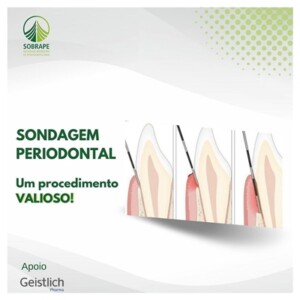 *Renata Cimões
*Renata Cimões
Periodontal probing is a simple, quick and very valuable procedure.
Through this examination it is possible to find out a lot of information about the patient's periodontal condition.
We get an idea of bone loss, we measure probing depth, we measure retractions, we observe whether there is bleeding.
In many clinical situations it is not possible to make a diagnosis by observation alone, which is why at all initial appointments and preventive maintenance appointments I probe the patient's entire mouth.
This test is not just for patients with periodontitis, but all patients should undergo this procedure.
It is important to remember that it is painless.
*SOBRAPE's social responsibility committee.
 * Dr. Renata Cimões
* Dr. Renata Cimões
In addition to bleeding, there are some other characteristics that show that your gums are healthy.
When you're healthy, you'll notice:
- There is no space between the teeth, the papillae fill the entire space
- There is no retraction, no part of the tooth roots is showing
- The color of the gums is pinkish
- The gums form an arch around the teeth
- No part has edema (swelling)
Then make sure your gums are healthy.
* SOBRAPE's Social Responsibility Committee.
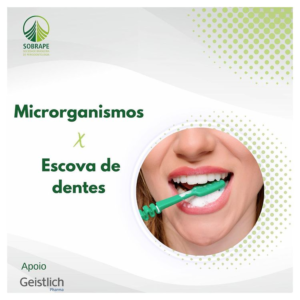
*Juliana Butze
The toothbrush, however, as well as other oral hygiene devices and dental instruments, and especially those used in periodontics, can act as vectors in intraoral bacterial translocation by reaching most microbial niches, thus constituting a source for bacterial / viral infection and reinfection.
Toothbrushes can become contaminated through contact with the oral cavity, the environment, hands, aerosols and storage containers.
The installation of microorganisms is inevitable and after a single brushing session it is already possible to find mutans streptococci.
Scientific evidence shows a direct correlation between contaminated toothbrushes and the occurrence of infections in the oral cavity.
The long microbial survival time can be enhanced by the storage conditions of the brushes after use.
Reports in the literature point to storage in toilets as a place where bristles are presumed to be contaminated by enterobacteria, especially fecal coliforms from aerosols formed by flushing toilets!
.
*SOBRAPE's Social Responsibility Committee.
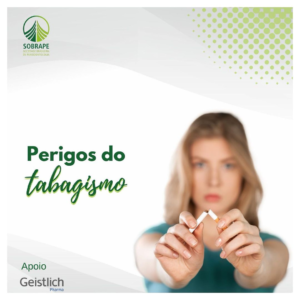 *JulianaButze
*JulianaButze
No dentist supports smoking. And this one is no exception! But more than personal opinion, it's important that you understand what's behind this habit.
Firstly, nicotine and tar, which are deposited on the tooth surface, turn teeth yellow and encourage the development of periodontal disease.
Smoking increases the risk of developing periodontitis threefold and speeds up its progression because it has a vasoconstrictive effect, which ends up impairing the irrigation of the periodontium.
Smoking hinders and delays the healing process of wounds, both traumatic and surgical, and is a complicating factor for periodontal and dental surgery in general.
As it reduces the ability of tissues to regenerate, it is also linked to lower success rates in the placement of dental implants, as it is more difficult for the implant to osseointegrate in smokers.
Cigarette smoking favors the appearance of cavities, since smoking causes the teeth to lose their support, exposing the roots and decreasing the production of saliva, which helps protect against cavities.
And finally, we must remember oral cancer, the risk of which is increased due to the high number of carcinogenic substances contained in cigarettes.
*SOBRAPE's Social Responsibility Committee.
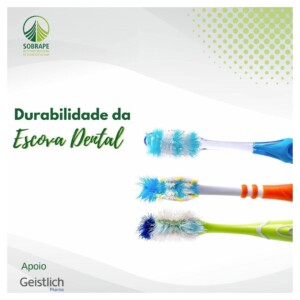 *Juliana Butze
*Juliana Butze
In general, the durability of toothbrushes is related to the diameter of the bristles used and soft and extra-soft bristles have a shorter lifespan than a hard or medium brush.
It is estimated that, on average, the toothbrush should be replaced every 3 months, but as wear varies between individuals, the replacement period should be determined individually according to the loss of functionality of the bristles as they become divergent.
The toothbrush should be stored clean, without residue (from toothpaste or food), in a place where it can dry quickly and without coming into direct contact with other brushes.
*SOBRAPE's social responsibility committee.
.
